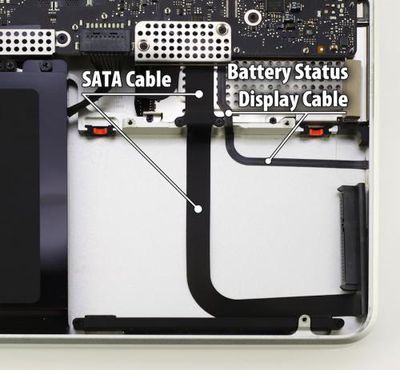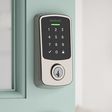Other World Computing reports that it has discovered a fix for an issue with SATA performance on Apple's latest 17-inch MacBook Pro models that has caused problems with solid state drive performance.
For over a month, we've been following reports from some MacBook Pro 2011 model users - almost exclusively those with 17" models, where issues with other brand 6Gb/s SSDs have been encountered. The main issue reported was that the drive simply wasn't being seen/working.
Investigation of the issue reveals that it appears to be related to the battery indicator cable and the SATA connection cable to the drive running next to each other at one point within the machine's chassis, resulting in interference that is degrading SATA performance. The cable configuration is unique to the 17-inch model and thus the issue has not been demonstrated in the smaller 13-inch and 15-inch MacBook Pros.
In order to address the issue, OWC is offering a cable shielding kit priced at $9.99. Users who purchase a new OWC-branded drive for installation in their machine can obtain the shielding kit for a discounted price of only $2.99.

























Top Rated Comments
In the meantime, here's the "before" benchmark with my 120GB Vertex 3:
disktester rs -t 4G -i 20 Macintosh\ HD
------------- Averages for "Macintosh HD" (4GB/4MB, 20 iterations) -------------
Iteration Write MB/sec Read MB/sec
1 427 515
2 434 505
3 430 509
4 432 507
5 428 508
6 436 511
7 426 507
8 432 508
9 431 505
10 426 508
11 426 509
12 428 507
13 429 509
14 425 506
15 428 508
16 427 507
17 427 505
18 430 507
19 425 504
20 428 509
Slowest 425 504
Fastest 436 515
Average 429 508
Median 428 508
Range 10.7 10.2
Command "run-sequential" executed in 361.19 seconds on Monday, April 18
I totally agree, people expect Apple to test their products with parts that they don't sell and that are not even on the market at the time they released!
Nowhere in the spec does it say that they support SATA 3.0. Vertex 3, intel 510, OWC 6Gb... were not released at the time that the new mbps came out so even if apple wanted to test they would have had to work with beta drives that they don't officially support and have no interest in promoting.
I was in the same bandwagon before when I put an x25-m in my 2008 mbp and had issues. In the end it was not the drive it was a problem with the main board but it took me a long time to figure that out. That is the price of wanting to be on the cutting edge. And is not Apples fault.
I have a new 17" 2.2 quad with a 128Gb SSD from apple and I have no issues at all it run's without beachball like the Vertex 3 as an example.
Really? And where are you getting this information from? I'm an engineer and Apple Tech (amongst many other things) and NO WHERE in Apple's technical notes with regards to build, I/O, etc. do they mention using the newer SATA III spec.
IF Apple was going to update a specific hardware related interface, and especially in this case, upgrade an existing consumer technology (sata II to III), they would highlight as part of a product feature; i.e. Thunderbolt from '11 models vs. Mini-Display Port from all other models since '09.
If somehow you forum trollers have information I don't great-good for you BUT please remember that Apple ships products and tests them with regards to what they know works and NOT every aftermarket, 3rd party upgrade. And if the battery status LED cable is actually causing an interference issue then it's not Apple's problem. Go find an SSD that doesn't cause this issue or order Apple's 256 or 512GB SSD option since that CLEARLY has no problems.
And now for the final point which makes all of this moot: write speeds to SSD's come no where close to actualizing a SATA III throughput. You're talking about 750 megabytes (not megabits) per second write to an SSD to utilize SATA III. Show me an MLC SSD that could actually do this??? And if you think I forgot about Read speads-SATA II more than maximizes read throughput from and internal SSD HD on Apple's architecture.
I can't believe people post on here things like, "I'm marching in to Apple to have my SATA cable replaced.." and "how could engineering miss something like this.." etc. REALLY PEOPLE??
And does it have the issues mentioned? Haven't heard that.
This isn't remotely a QA issue. If it is anything, it's a design issue.
But yes, the cable is link speed 3 Gbit, not a 6 Gbit link speed design.. so what? The 17" Unibody MBP is a chassis design that's three years old, now. There's no indication whatsoever that it does support 6 Gbit link speed anywhere on the apple website that I can see. Yes, the chipset supports it -- the chipset also supports a dozen USB ports and of SATA 2 6Gbit ports with 4 3Gbit ports. If you were really unlucky, the HD would have hung off one of the secondary slower ports.
This is one of the ways Apple can afford to spend so much on chassis design and production -- and don't think they don't -- they use a given chassis with very little changes for quite a while.
Of course this is page 2 news. It apparently does not apply to MacBook Pros as sold by Apple. The problems arise when someone decides to upgrade(?) the 'basic' 750 GB HD that comes with the machine. If one wants to pay a whole lot more - $450 MORE to get a 512 GB SSD instead of the 750 GB HD - then one might have a problem. I would not think that would be very likely.
- great tutorials / instructions on the webpage
- if there is a problem they investigate and find solution
- they offer good deals for effected customers
- they anyway have great deals
Just love that site - should be first stop for upgrades for everyone.